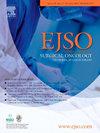The prognostic effect of recurrent laryngeal nerve palsy after esophagectomy in locally advanced esophageal squamous cell carcinoma: A multi-center retrospective study
IF 3.5
2区 医学
Q2 ONCOLOGY
引用次数: 0
Abstract
Background
Postoperative pneumonia following esophagectomy has been shown to adversely affect prognosis, whereas the prognostic significance of recurrent laryngeal nerve palsy (RLNP) remains unclear. This multicenter Japanese study aimed to evaluate the impact of RLNP on prognosis in patients undergoing esophagectomy for locally advanced esophageal squamous cell carcinoma (ESCC).
Methods
A total of 343 patients with clinical Stage I–IVA ESCC who underwent esophagectomy between 2010 and 2019 at five Japanese specialized esophageal cancer centers was retrospectively collected. The occurrence of RLNP was assessed for its association with short- and long-term outcomes.
Results
RLNP was observed in 65 patients (19.0 %). The 3-year overall survival (OS) rates were 69.8 % in the RLNP+ group and 70.5 % in the RLNP− group, with no significant difference (hazard ratio [HR]: 1.02, 95 % confidence interval [CI]: 0.65–1.59, p = 0.95). RLNP was significantly associated with clinical N-positive status (p = 0.04) and intrathoracic anastomosis (p = 0.03) but was not correlated with other clinicopathological or perioperative factors. Although RLNP+ patients had longer postoperative hospital stays, there were no significant differences in operative time, blood loss, number of harvested lymph nodes, or rates of postoperative complications, including pneumonia and anastomotic leakage. Multivariable analysis identified postoperative pneumonia as a poor prognostic factor for OS (HR: 1.60, 95 % CI: 1.06–2.41, p = 0.03), whereas RLNP was not (HR: 0.91, 95 % CI: 0.58–1.43, p = 0.69).
Conclusions
This study demonstrated that RLNP following esophagectomy for locally advanced ESCC does not significantly affect long-term survival.
食管切除术后喉返神经麻痹对局部晚期食管鳞状细胞癌预后的影响:一项多中心回顾性研究
食管切除术后肺炎已被证明对预后有不利影响,而喉返神经麻痹(RLNP)的预后意义尚不清楚。这项日本多中心研究旨在评估RLNP对局部晚期食管鳞状细胞癌(ESCC)行食管切除术患者预后的影响。方法回顾性收集2010年至2019年在日本5家食管癌专科中心接受食管切除术的临床I-IVA期ESCC患者343例。评估RLNP的发生与短期和长期预后的关系。结果65例(19.0%)患者出现rlnp。RLNP+组3年总生存率为69.8%,RLNP−组为70.5%,差异无统计学意义(风险比[HR]: 1.02, 95%可信区间[CI]: 0.65 ~ 1.59, p = 0.95)。RLNP与临床n阳性状态(p = 0.04)和胸内吻合(p = 0.03)显著相关,但与其他临床病理及围手术期因素无关。虽然RLNP+患者术后住院时间较长,但在手术时间、出血量、淋巴结清扫数量或术后并发症(包括肺炎和吻合口漏)发生率方面没有显著差异。多变量分析确定术后肺炎是OS的不良预后因素(HR: 1.60, 95% CI: 1.06-2.41, p = 0.03),而RLNP则不是(HR: 0.91, 95% CI: 0.58-1.43, p = 0.69)。结论本研究表明,局部晚期ESCC食管切除术后RLNP对长期生存无显著影响。
本文章由计算机程序翻译,如有差异,请以英文原文为准。
求助全文
约1分钟内获得全文
求助全文
来源期刊

Ejso
医学-外科
CiteScore
6.40
自引率
2.60%
发文量
1148
审稿时长
41 days
期刊介绍:
JSO - European Journal of Surgical Oncology ("the Journal of Cancer Surgery") is the Official Journal of the European Society of Surgical Oncology and BASO ~ the Association for Cancer Surgery.
The EJSO aims to advance surgical oncology research and practice through the publication of original research articles, review articles, editorials, debates and correspondence.
 求助内容:
求助内容: 应助结果提醒方式:
应助结果提醒方式:


